Shahab Hamidi-Rad
Wireless Dataset Similarity: Measuring Distances in Supervised and Unsupervised Machine Learning
Jan 03, 2026Abstract:This paper introduces a task- and model-aware framework for measuring similarity between wireless datasets, enabling applications such as dataset selection/augmentation, simulation-to-real (sim2real) comparison, task-specific synthetic data generation, and informing decisions on model training/adaptation to new deployments. We evaluate candidate dataset distance metrics by how well they predict cross-dataset transferability: if two datasets have a small distance, a model trained on one should perform well on the other. We apply the framework on an unsupervised task, channel state information (CSI) compression, using autoencoders. Using metrics based on UMAP embeddings, combined with Wasserstein and Euclidean distances, we achieve Pearson correlations exceeding 0.85 between dataset distances and train-on-one/test-on-another task performance. We also apply the framework to a supervised beam prediction in the downlink using convolutional neural networks. For this task, we derive a label-aware distance by integrating supervised UMAP and penalties for dataset imbalance. Across both tasks, the resulting distances outperform traditional baselines and consistently exhibit stronger correlations with model transferability, supporting task-relevant comparisons between wireless datasets.
Comparing Stochastic and Ray-tracing Datasets in Machine Learning for Wireless Applications
Dec 13, 2025Abstract:Machine learning for wireless systems is commonly studied using standardized stochastic channel models (e.g., TDL/CDL/UMa) because of their legacy in wireless communication standardization and their ability to generate data at scale. However, some of their structural assumptions may diverge from real-world propagation. This paper asks when these models are sufficient and when ray-traced (RT) data - a proxy for the real world - provides tangible benefits. To answer these questions, we conduct an empirical study on two representative tasks: CSI compression and temporal channel prediction. Models are trained and evaluated using in-domain, cross-domain, and small-data fine-tuning protocols. Across settings, we observe that stochastic-only evaluation may over- or under-estimate performance relative to RT. These findings support a task-aware recipe where stochastic models can be leveraged for scalable pre-training and for tasks that do not rely on strong spatiotemporal coupling. When that coupling matters, pre-training and evaluation should be grounded in spatially consistent or geometrically similar RT scenarios. This study provides initial guidance to inform future discussions on benchmarking and standardization.
Physics-Informed Generative Approaches for Wireless Channel Modeling
Mar 11, 2025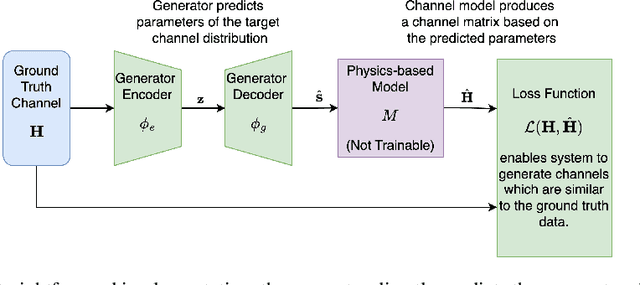
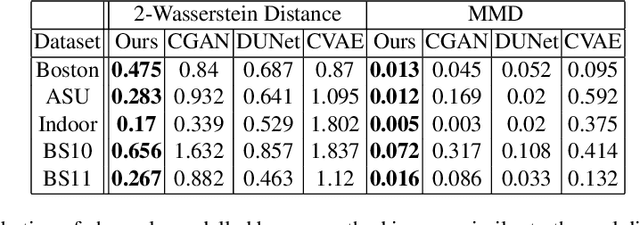
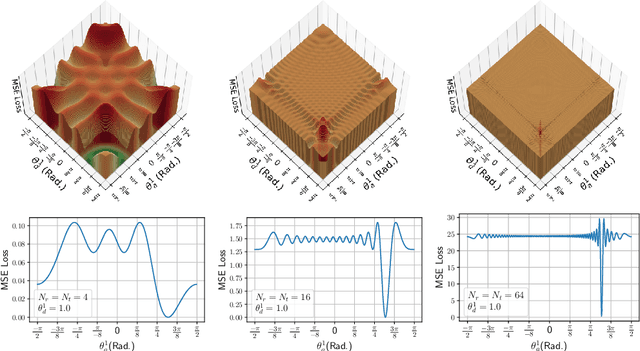

Abstract:In recent years, machine learning (ML) methods have become increasingly popular in wireless communication systems for several applications. A critical bottleneck for designing ML systems for wireless communications is the availability of realistic wireless channel datasets, which are extremely resource intensive to produce. To this end, the generation of realistic wireless channels plays a key role in the subsequent design of effective ML algorithms for wireless communication systems. Generative models have been proposed to synthesize channel matrices, but outputs produced by such methods may not correspond to geometrically viable channels and do not provide any insight into the scenario of interest. In this work, we aim to address both these issues by integrating a parametric, physics-based geometric channel (PBGC) modeling framework with generative methods. To address limitations with gradient flow through the PBGC model, a linearized reformulation is presented, which ensures smooth gradient flow during generative model training, while also capturing insights about the underlying physical environment. We evaluate our model against prior baselines by comparing the generated samples in terms of the 2-Wasserstein distance and through the utility of generated data when used for downstream compression tasks.
A Dataset Similarity Evaluation Framework for Wireless Communications and Sensing
Dec 07, 2024Abstract:This paper introduces a task-specific, model-agnostic framework for evaluating dataset similarity, providing a means to assess and compare dataset realism and quality. Such a framework is crucial for augmenting real-world data, improving benchmarking, and making informed retraining decisions when adapting to new deployment settings, such as different sites or frequency bands. The proposed framework is employed to design metrics based on UMAP topology-preserving dimensionality reduction, leveraging Wasserstein and Euclidean distances on latent space KNN clusters. The designed metrics show correlations above 0.85 between dataset distances and model performances on a channel state information compression unsupervised machine learning task leveraging autoencoder architectures. The results show that the designed metrics outperform traditional methods.
Deep OFDM Channel Estimation: Capturing Frequency Recurrence
Jan 07, 2024Abstract:In this paper, we propose a deep-learning-based channel estimation scheme in an orthogonal frequency division multiplexing (OFDM) system. Our proposed method, named Single Slot Recurrence Along Frequency Network (SisRafNet), is based on a novel study of recurrent models for exploiting sequential behavior of channels across frequencies. Utilizing the fact that wireless channels have a high degree of correlation across frequencies, we employ recurrent neural network techniques within a single OFDM slot, thus overcoming the latency and memory constraints typically associated with recurrence based methods. The proposed SisRafNet delivers superior estimation performance compared to existing deep-learning-based channel estimation techniques and the performance has been validated on a wide range of 3rd Generation Partnership Project (3GPP) compliant channel scenarios at multiple signal-to-noise ratios.
Frequency-aware Learned Image Compression for Quality Scalability
Jan 03, 2023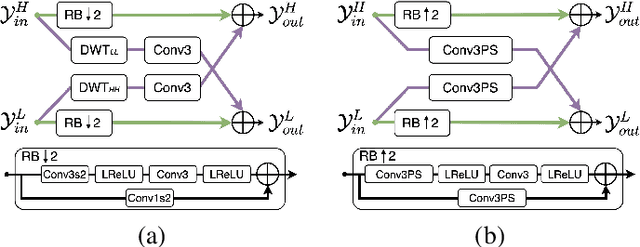

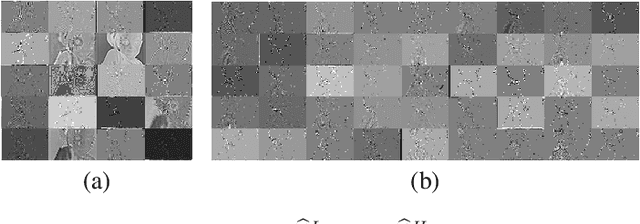
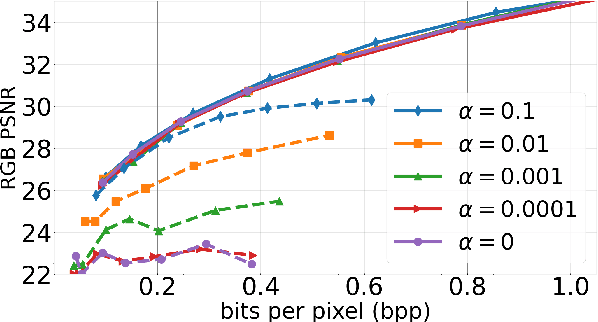
Abstract:Spatial frequency analysis and transforms serve a central role in most engineered image and video lossy codecs, but are rarely employed in neural network (NN)-based approaches. We propose a novel NN-based image coding framework that utilizes forward wavelet transforms to decompose the input signal by spatial frequency. Our encoder generates separate bitstreams for each latent representation of low and high frequencies. This enables our decoder to selectively decode bitstreams in a quality-scalable manner. Hence, the decoder can produce an enhanced image by using an enhancement bitstream in addition to the base bitstream. Furthermore, our method is able to enhance only a specific region of interest (ROI) by using a corresponding part of the enhancement latent representation. Our experiments demonstrate that the proposed method shows competitive rate-distortion performance compared to several non-scalable image codecs. We also showcase the effectiveness of our two-level quality scalability, as well as its practicality in ROI quality enhancement.
Vandermonde Constrained Tensor Decomposition for Hybrid Beamforming in Multi-Carrier MIMO Systems
Nov 30, 2022



Abstract:Hybrid beamforming has evolved as a promising technology that offers the balance between system performance and design complexity in mmWave MIMO systems. Existing hybrid beamforming methods either impose unit-modulus constraints or a codebook constraint on the analog precoders/combiners, which in turn results in a performance-overhead tradeoff. This paper puts forth a tensor framework to handle the wideband hybrid beamforming problem, with Vandermonde constraints on the analog precoders/combiners. The proposed method strikes the balance between performance, overhead and complexity. Numerical results on a 3GPP link-level test bench reveal the efficacy of the proposed approach relative to the codebook-based method while attaining the same feedback overhead. Moreover, the proposed method is shown to achieve comparable performance to the unit-modulus approaches, with substantial reductions in overhead.
 Add to Chrome
Add to Chrome Add to Firefox
Add to Firefox Add to Edge
Add to Edge